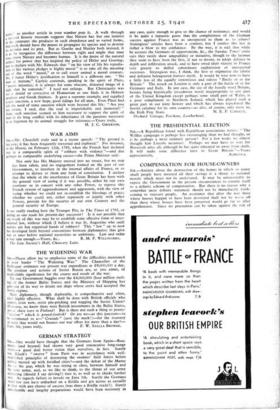WAR AIMS Snt,—Mr. Churchill truly said in a recent speech:
"The ground is. not new; it has been frequently traversed and explored." For instance, in the House, on February 12th, 1793, when the French had declared war in a comparable spirit of "robbery with violence "—and due perhaps to comparable underlying causes—the Prime Minister said:
Not only has His Majesty entered into no treaty, but no step has been taken, and no engagement formed on the part of our Government, to interfere in the internal affairs of France, or to attempt to dictate to them any form of constitution. I declare that the whole of the interference of Great Britain has been with the general view of seeing if it was possible, either by our own exertions or in concert with any other Power, to repress this French system of aggrandisement and aggression, with the view of- seeing whether we could not re-establish the blessings of peace; whether we could not, either Separately or jointly with other Powers, provide for the security- of our own Country and the general security of Europe.
Is one really reading here the Younger Pitt, in The Times of 1793, or dozing as one reads his present-day successor? Is it not possible that one result of this war may be to establish some effective form of inter- national law, without which (I believe it was St. Augustine who said) nations are but organised bands of robbers? This " law " up to now has developed little beyond conventions between diplomatists that give way at once before national necessities or ambitions. Law and order is war aim enough.—Yours, &c., R. M. P. WILLOUGHBY. Thc Law Society's Hall, Chancery Lane.


























 Previous page
Previous page